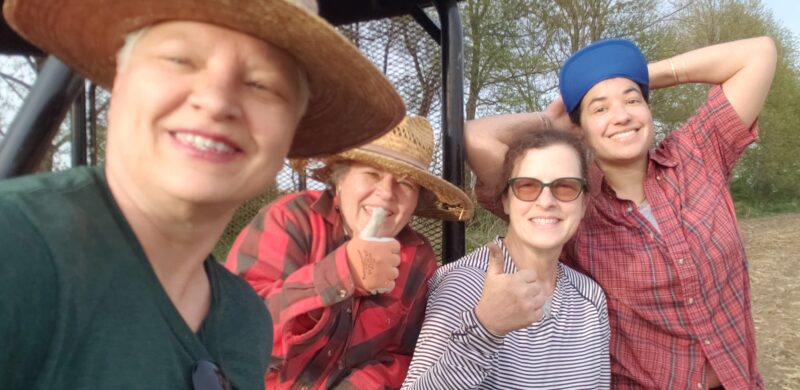Some Climate Land Leaders live on their land and farm it themselves. Others live on the land and don’t farm, and still others live across the country from the land they own. And the cohort includes every combination in between.
But all of them agree: They are NOT “absentee landowners.”
In their words, they are:
“Land leaders.”
“Land advocates.”
“Land stewards.”
“Engaged landowners.”
“Landowners who lead, who are fully engaged, who are good stewards and have boots on the ground.”
Climate Land Leader Mary Damm owns land in Northeast Iowa that is a haven for grassland birds and other critters. She keeps an apartment nearby and lives much of the year in her home state of Indiana. She says she is financially and morally invested in the health of the land, plants and animals of Iowa. “I get mad at being called an absentee landowner. As a conservation biologist, caring for this farm is the most important thing I can do.”

Climate Land Leader Jane Shey lives part time in North-Central Iowa on the family farm and part-time in Maryland. She says, “A landowner living and working on a farm can be absentee to their land, to the soil and to their responsibility to the community. And tenants can do the bare minimum and not take care of the land as well.”
She prefers the terms “land steward” and “caretaker.”
“The land, the soil, the natural habitat are for the benefit of the community. The land feeds people, provides a natural environment and home for ‘all the relatives’/living creatures. A doctor takes an oath to ‘do no harm’. I believe that farming and land stewardship/caretaking is in a similar category. Not only should we do no harm but we should leave the land better than we found it. Destroying the soil and the natural environment is a bit like chopping a hole in the bottom of a boat that keeps a group of people out of the water. We breathe the air, drink the water and if the landowner doesn’t live in the area, at least the community where the land is located does.”
According to Climate Land Leader Carol Bouska, “although I realize that some have issues with land ‘owners,’ I feel that under the current structure, this is what we are, and who we are known as – to renters/operators, to the government, etc. I also think that we should embrace that we have this power of ownership and therefore have decided to take responsibility to do something positive with it. Having said all that, I also feel that it is important to acknowledge that we know that we obtained ‘ownership’ through injustice, that no one really ‘owns’ the earth but rather that we are stewards.”